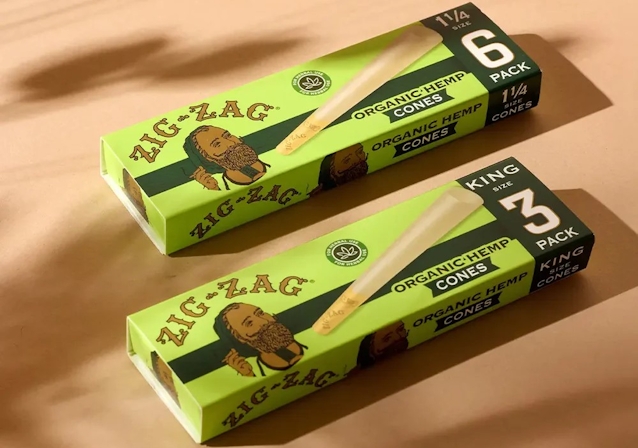
Photo Courtesy of zig zag papers
Rolling Through Time: The Legacy of Zig-Zag Papers from Paris to Pop Culture
The story of a 141-year-old rolling paper company that became one of the most widely recognized brands in cannabis and cannabis culture.
Zig-Zag has been an integral part of rolling culture for a long time. It started in a Paris paper mill and, over the years, turned into one of those names almost everyone recognizes, especially people who roll with cannabis or tobacco. The logo, the packaging, the way the zig-zag papers burn, it all stuck. The brand didn’t stay the same, but it didn’t lose what made it work either. You’ll see it in someone’s pocket, in a painting, on a shirt, or in a stash box. Zig-Zag started more than 150 years ago, and it’s still here, part of the culture, part of the roll.
Key Takeaways

Photo Courtesy of zig zag papers
- Zig-Zag was founded in 1855 in Paris by Maurice and Jacques Braunstein
- The name “Zig-Zag” comes from their 1894 patent for interleaved paper packaging
- Won gold at the 1900 Universal Exposition in Paris
- Zig-Zag joint papers became a favorite among cannabis and tobacco consumers
- Expanded into branded apparel, accessories, and artist collaborations
- Currently owned by Republic Technologies, with creative projects like Zig-Zag Studio
Origins of Zig-Zag Papers in Paris

Photo Courtesy of zig zag papers
By the mid-1800s, rolling your own cigarettes was common across Europe. In Paris, smokers had limited options; many rolling papers tore easily or burned unevenly. France already had a reputation for making quality paper, and in 1855, the Braunstein brothers invented a better option. Their zig-zag rolling papers were easier to handle, more consistent, and gave smokers a cleaner, more reliable experience.
Zig-Zag offered something different. The product worked better, and the brand started gaining attention. The orange pack became familiar, and smokers began to choose it for its quality, flavor neutrality, and slow-burning performance. It wasn’t long before Zig-Zag stood out as one of the best rolling papers available.
Founders Maurice & Jacques Braunstein
Maurice and Jacques Braunstein ran a paper mill near Paris and saw potential in making a specific type of product: rolling papers that were cut, packaged, and presented in a new way. They focused on usability and reliability, something smokers needed at the time.
In 1894, they patented an interleaving system that changed how papers were packed. Each page would pull the next one forward in a zig-zag motion, which gave the brand its name. The method added function, but also personality. It was easy to see and easy to verify. The innovation turned their papers into a booklet you could count on: neat, compact, and ready to roll.
Zig-Zag Grows Global

Photo Courtesy of zig zag papers
After winning gold at the 1900 Universal Exposition in Paris, Zig-Zag’s reputation took off. The brand was officially trademarked in 1906 and started expanding across Europe and beyond. New manufacturing facilities were added to support the growth. The original plant in Saint Aubin was eventually relocated to Thonon-les-Bains, a town near the Alps with access to clean spring water, perfect for papermaking. That fresh Alpine water is still part of the process today.
Zig-Zag’s logo also helped cement its identity. The illustration of the French Zouave soldier, said to have rolled a cigarette with paper after his pipe was broken in battle, became the face of the brand. That piece of visual history added character and gave Zig-Zag an image that stood out on any shelf.
By mid-century, Zig-Zag was sold in multiple sizes, including the classic single-wide and the longer king-size. The orange pack became iconic. Whether you rolled joints or cigarettes, Zig-Zag rolling papers were trusted by smokers around the world.
Zig-Zag Joint Papers and Brand in Cannabis Culture

Photo Courtesy of zig zag papers
People rolled joints with Zig-Zag papers because they worked. They were easy to find, held up well, and provided a slow-burning experience that helped preserve flavor. Over time, Zig-Zag joint papers showed up everywhere: on concert floors, in college apartments, in glove boxes, and at smoke sessions across the country.
They weren’t flashy, but they were reliable. You didn’t have to think too hard; if someone handed you a joint, it was probably rolled with Zig-Zag. The brand became part of cannabis culture not just because of its product, but also because it consistently showed up at the right time.
Beyond Papers: Clothing Line, Vintage Collections, and More
Zig-Zag didn’t stop at rolling papers. The brand has grown into a lifestyle name with drops that include t-shirts, grinders, trays, artist collabs, and collectible tins. Some are new pieces, others are throwbacks, perfect for anyone who wants to add some style to their stash setup.
Zig-Zag’s vintage designs and newer items both speak to the brand’s place in culture. It’s not just about rolling anymore. Whether you’re wearing the shirt, displaying the art, or packing a tray, it’s a way to connect with something older that still feels current.
Who Owns Zig-Zag Papers Today?

Photo Courtesy of zig zag papers
Zig-Zag is now owned by Republic Technologies, Inc., a company that manages several major rolling paper brands. They’ve kept Zig-Zag’s identity intact while continuing to grow its product line and cultural relevance.
One of their recent projects is Zig-Zag Studio, a creative platform that highlights artists and storytellers connected to the rolling world. The studio adds another layer to the brand: part collaboration hub, part archive, part cultural statement.
With over a century behind it, Zig-Zag remains a staple. It’s a name that still shows up when people roll, choose options, and cut corners their own way. Whether you’re using the king-size for a long session or keeping an orange pack in your pocket, Zig-Zag is still doing what it started out to do: making the moment work.
Herb Recommended Products:
READ MORE










